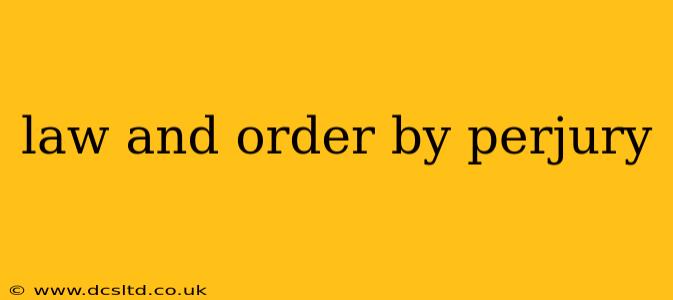Perjury, the act of lying under oath, is a serious offense with significant legal ramifications. This crime undermines the integrity of the justice system, and those found guilty face severe penalties. Understanding the nuances of perjury, including what constitutes it, the defenses available, and the potential punishments, is crucial for both legal professionals and the general public.
What Constitutes Perjury?
Perjury is typically defined as making a false statement under oath, knowing the statement to be false, in a legal proceeding. This means the lie must be material—meaning it must be relevant to the case and potentially influence its outcome. A minor, inconsequential falsehood wouldn't necessarily qualify as perjury. The intent to deceive is also a key element. Simply making a mistake or being mistaken isn't perjury; the act must be deliberate.
The specific elements of perjury can vary slightly depending on the jurisdiction. For example, some states may require a specific level of awareness of the falsity of the statement, while others may have different standards for materiality. It's therefore essential to consult the specific laws of the relevant jurisdiction.
What are the Defenses Against Perjury Charges?
While proving perjury requires demonstrating intent and materiality, several defenses can be employed. These include:
- Lack of intent: The defendant might argue they didn't intentionally lie, perhaps due to confusion, memory lapses, or misunderstanding of the question. This defense hinges on proving a lack of mens rea (guilty mind).
- Mistake of fact: The defendant may claim they believed their statement to be true, even if it later proves false. This hinges on showing they acted in good faith based on their understanding of the facts at the time.
- Lack of materiality: The defendant could argue the false statement was inconsequential to the case and did not influence its outcome. This requires demonstrating the statement was immaterial to the proceedings.
What are the Penalties for Perjury?
Penalties for perjury vary widely depending on the jurisdiction, the severity of the offense, and other factors. They can range from significant fines to lengthy prison sentences. In some cases, particularly those involving high-profile cases or significant deception, the penalties can be exceptionally harsh. A conviction for perjury can also significantly impact an individual's reputation and future opportunities.
Can you be charged with perjury for lying to the police?
This depends on the circumstances. While lying to the police isn't automatically perjury, it can become perjury if the lie is made under oath, such as during a sworn deposition or testimony in court. If a police officer administers an oath before taking a statement, then lying in that statement could be considered perjury. However, simply lying to a police officer during an informal interview, without an oath, generally wouldn’t be considered perjury. It could, however, lead to other charges, like obstruction of justice.
What is the difference between perjury and false statements?
Perjury specifically refers to false statements made under oath. False statements, on the other hand, encompass a broader range of untruthful assertions. Making a false statement outside of a legal proceeding might not constitute perjury but could still result in legal consequences depending on the context and the nature of the falsehood. For example, filing a false tax return or making false statements on a loan application can lead to separate criminal or civil charges.
How is perjury proven in court?
Proving perjury often relies on corroborating evidence. This might include contradictory testimony from other witnesses, physical evidence, or documentary proof that directly contradicts the defendant's sworn statement. The prosecution needs to demonstrate beyond a reasonable doubt that the defendant knowingly made a false statement under oath and that the statement was material to the case.
This overview provides a general understanding of perjury. The specifics of the crime and its consequences can differ significantly depending on the relevant jurisdiction and the circumstances of the case. Consult with a legal professional for specific legal advice related to perjury.
